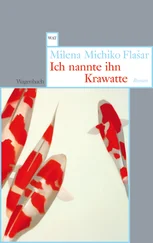Why was he not with them? I speculated about it. Perhaps he was just traveling through and he’d missed his connection. Had to wait until. Or was just simply. I could not find an explanation.
His bento, this time it had rice balls, tempura, a seaweed salad. He separated the chopsticks, paused, stroked his eyes with the back of his hand, a surreptitious movement. His clenched jaw, I saw it, it was trembling. I was embarrassed to see he was weeping. It was a suppressed weeping, and I alone was his witness. The embarrassment continued: Who weeps in broad daylight? Who reveals himself to that extent? And not only to himself, but to me, the observer! He shouldn’t weep, not in front of me. He should be behind closed doors. He should know that. That weeping is a private matter. I shuddered at the memory of a squashed body on the asphalt. Dreadful. To stand nearby, dumb with shock. The white hand, strangely bent, pointed at me. Of all the bystanders, at me. I wanted to be blind. The sirens of the rescue vehicle blared at me. Never again, I swore to myself, would I share the pain of others. He should know that. That weeping and dying are private matters.
15
The sound of him clearing his throat. He pulled himself together. At first his chin quivered, then it became still and he didn’t blink. With a cigarette between his lips, he went behind the bushes. A zipper whizzed open and closed again, twigs crackled. I had seen too much. Even before he got back, I was on my feet and had run away. Out of the park, beyond the intersection, past Fujimoto’s general store. Home. Into my room. The click of the lock. I was in a safe place. As dust whirled, I drew the curtains shut.
The next morning I slept longer than usual. I heard the alarm clock ringing next door, stayed in bed, went to sleep again. I dreamed of an invisible thread robbing me of air. I finally woke up gasping. Nothing had happened. Guided by this principle — nothing had happened — and its corollaries — nothing happens, nothing will ever happen — I went on my way.
As I entered the park he sat bent over his newspaper. Beside him his empty bento box. He was snoring. Spread on his knees, the Giants and the secret of their success, I read, creeping past him. He had undone his tie. It dangled loose round his neck. Hair crumpled at the back. I gave in. And that too was a decision. To give in, and give him, sleeping there, a name. It had gone that far, I gave him a name. Not Honda. Not Yamada. Not Kawaguchi. I simply called him Necktie. The name suited him. Redandgray.
16
So, Necktie.
It is the tie that wears you, not the other way around. Later that was a joke between us. The tie wears you. At which he smiled, then laughed, a great roar broke out. You are right. It’s a mistake to think that I’m the one who wears it. I don’t wear anything, nothing at all. At which point he broke off abruptly, then fell silent, stayed silent. If I could have foreseen this silence, I would have given him a different name. Yet it was worth it, for the sake of his laugh, the laughter that preceded the silence. He laughed much too seldom.
The name binds me to him. Like the vague sympathy beforehand, I began to feel a vague responsibility. To be with him, not to leave him alone. It’s grotesque to feel responsibility for a person about whom you could no longer just say: I would recognize him again. Rather: I know him. I know how he breathes, when he sleeps. The name entangled me. I no longer felt the freedom to simply get up and leave. That a name should possess such power.
17
Two weeks passed. He appeared every Monday, exactly at nine, every Tuesday, Wednesday, Thursday and Friday. He only stayed away on weekends. I missed him then. I had gotten so used to his presence that in his absence my presence in the park seemed somehow pointless. Without him and the questions he posed, I was a question mark with no purpose. There it is on a sheet of white paper, questioning the void.
Once, on a cloudy Friday in June, he was just about to nod off when it began to drizzle. He sat up, startled, stuck his newspaper over his head, whereas I, fortunately prepared, opened my umbrella, drew in my legs, and huddled under the protective shelter. First it dripped, then the drops soon turned into ribbons. He extended his hands into the rain, let the paper fall, closed his eyes. I watched as the water collected in his hands. He had formed them into a bowl. Plip-plop, it sprinkled on him. I was surprised. No salaryman likes to sit out in the rain. The park all around was indistinct and blurry. People scurrying everywhere. Nobody who is healthy sits out in the rain. Completely absorbed, already soaked to the bone, he seemed to experience no greater joy than to get wet like that. I stared transfixed at his happy face. He opened his eyes. He looked at me unexpectedly through the rain. I jumped up. I hadn’t counted on that. Not with this unexpected, knowing look. I am not alone, it said, you are there. Then he closed his eyes again.
18
I had fallen out of my anonymity, out of my cocoon. But that’s not quite right. His glance and the recognition he shined on me had merely illuminated the space around me a little. In the mornings he nodded to me. I nodded back. In the evenings he raised his hand as he left. I raised mine. A silent understanding. You are here. I am here. We both have the right to simply be here.
What changed between us was just one thing. I guessed it. Since he had seen me, I had become an image within him. Now he had a conception of me, and his daily greeting related to the image he had of me. He regarded it. Quietly. His look was not invasive. It was stored in his memories. He remembered a day by the sea, with fine sand, rough dune grass; he remembered his father’s beard, hard stubble on his chin, a certain light, how it fell on his wife’s back one morning in late autumn, a smile in a shop window, by chance, the warm fur of a cat that snuggled up against him. He had thousands of memories, thousands of images, and now, since he had noticed me, I was one of them.
I let it happen. I offered him my profile, held still, so he could absorb it. Looked over at him as well. Absorbed him further within me. So out of our minimal acquaintance grew a minimal friendship.
19
To speak with one another would still at this point in time have been going too far. There was a frontier, the gravel path. Here my bench, there — his. Between them were blades of grass, a rolling ball, a child tumbling after it.
I had practiced forgetting how to speak for two years. Granted, I had not succeeded. The language I had learned permeated me, and even when I was silent, my silence was eloquent. I spoke inner monologues, spoke incessantly into the void. But the sound of my voice had become alien to me. At night I sometimes woke bathed in sweat from a nightmare, only to find it continuing in the hoarse Aah forced from my belly, my lungs, my throat. Who is that shouting there, I asked myself, and fell asleep again. Wandered through a landscape in which every sound echoed as it was uttered. The last sentence I had spoken had been: I can no longer. Period. A vibrating period. After that something snapped shut. The effort it would cost to go on talking from where I had stopped was outweighed by the futility of expressing the inexpressible in words.
My room was like a cave, as always. I had grown up here. I had essentially lost my innocence here. I mean, growing up signifies a loss. You think you are winning. Really you are losing yourself. I mourned the child I had once been, whom I heard in rare moments pummeling wildly in my heart. At thirteen it was too late. At fourteen. At fifteen. Puberty a battle, I lost myself by the end. I hated my face in the mirror, the growing, the surging within. The scars on my hand all stem from the attempts to make it better. Countless mirrors smashed. I didn’t want to be a man who thinks he is winning. Didn’t want to fit into any suit. Not to be a father who tells his son: You must work. Father’s voice. Mechanical. He worked. When I looked at him I saw a future in which I would slowly, too slowly, lose my life. Nothing works, I replied. And then: I can no longer. This last sentence was my maxim. The motto that defined me.
Читать дальше












